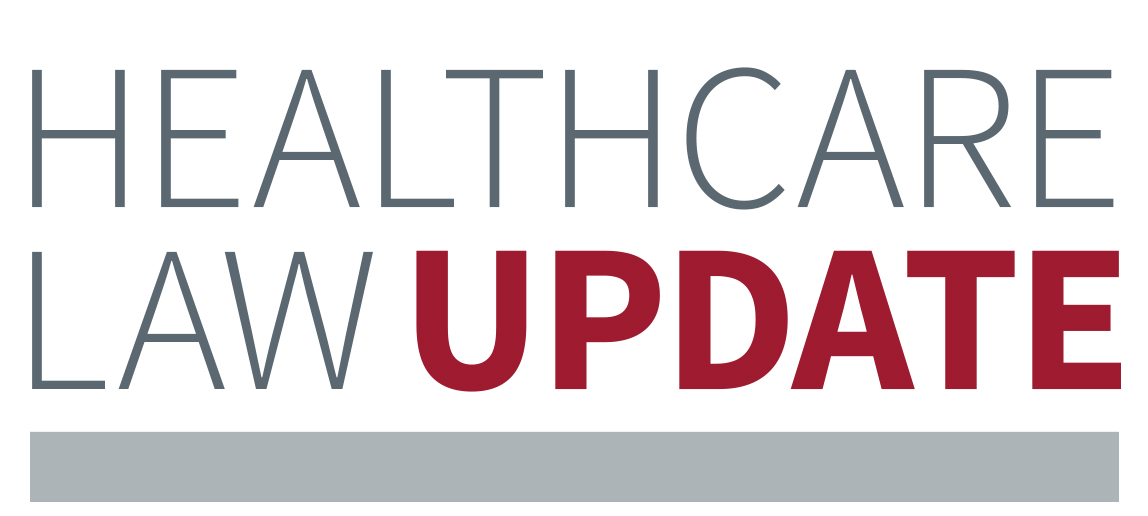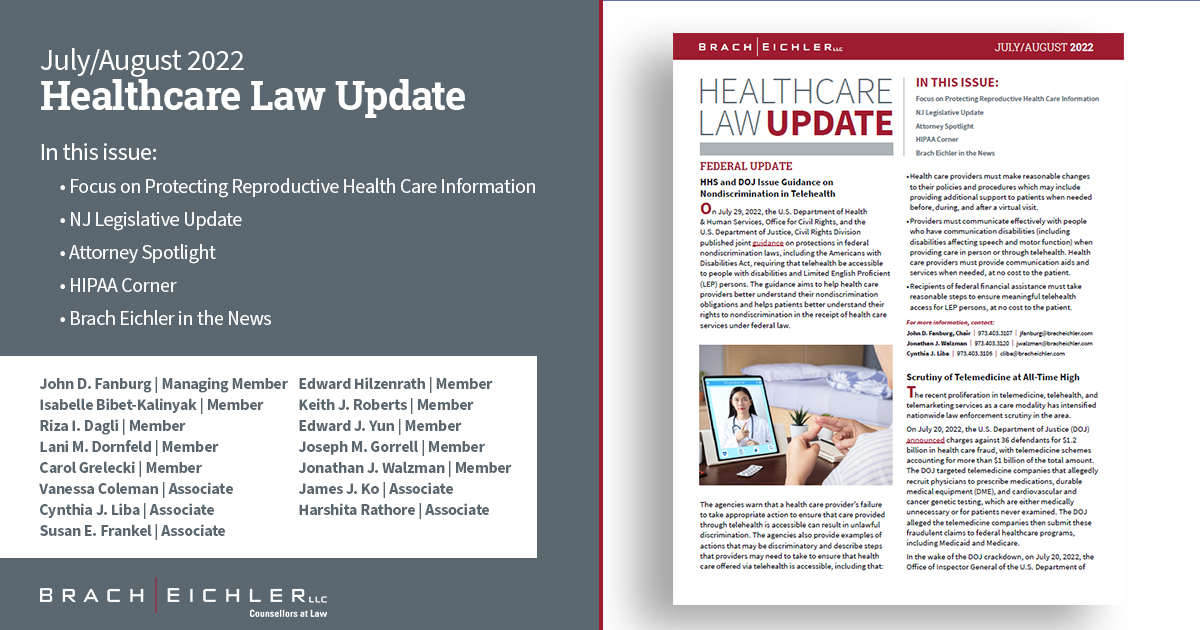

On July 29, 2022, the U.S. Department of Health & Human Services, Office for Civil Rights, and the U.S. Department of Justice, Civil Rights Division published joint guidance on protections in federal nondiscrimination laws, including the Americans with Disabilities Act, requiring that telehealth be accessible to people with disabilities and Limited English Proficient (LEP) persons. The guidance aims to help health care providers better understand their nondiscrimination obligations and helps patients better understand their rights to nondiscrimination in the receipt of health care services under federal law.

The agencies warn that a health care provider’s failure to take appropriate action to ensure that care provided through telehealth is accessible can result in unlawful discrimination. The agencies also provide examples of actions that may be discriminatory and describe steps that providers may need to take to ensure that health care offered via telehealth is accessible, including that:
• Health care providers must make reasonable changes to their policies and procedures which may include providing additional support to patients when needed before, during, and after a virtual visit.
• Providers must communicate effectively with people who have communication disabilities (including disabilities affecting speech and motor function) when providing care in person or through telehealth. Health care providers must provide communication aids and services when needed, at no cost to the patient.
• Recipients of federal financial assistance must take reasonable steps to ensure meaningful telehealth access for LEP persons, at no cost to the patient.
For more information, contact:
John D. Fanburg, Chair | 973.403.3107 | jfanburg@bracheichler.com
Jonathan J. Walzman | 973.403.3120 | jwalzman@bracheichler.com
Cynthia J. Liba | 973.403.3106 | cliba@bracheichler.com
The recent proliferation in telemedicine, telehealth, and telemarketing services as a care modality has intensified nationwide law enforcement scrutiny in the area.
On July 20, 2022, the U.S. Department of Justice (DOJ) announced charges against 36 defendants for $1.2 billion in health care fraud, with telemedicine schemes accounting for more than $1 billion of the total amount. The DOJ targeted telemedicine companies that allegedly recruit physicians to prescribe medications, durable medical equipment (DME), and cardiovascular and cancer genetic testing, which are either medically unnecessary or for patients never examined. The DOJ alleged the telemedicine companies then submit these fraudulent claims to federal healthcare programs, including Medicaid and Medicare.
In the wake of the DOJ crackdown, on July 20, 2022, the Office of Inspector General of the U.S. Department of
Health & Human Services (OIG) issued a Special Fraud Alert detailing suspect characteristics in telemedicine arrangements and urging practitioners to exercise caution when entering into such arrangements with telemedicine companies. The alert identifies an illustrative list of suspect characteristics, which taken together or separately, suggest an arrangement with heightened risk of abuse and fraud including: (i) the patients for whom the healthcare practitioner prescribes or orders services or items were identified or recruited by the telemedicine company by advertising free or low out-of-pocket cost items or services; (ii) the healthcare practitioner has insufficient contact or information from the patient to assess the medical necessity of prescribed items or services, for example, the telemedicine company

provides medical records that reflect only cursory patient demographic information or a ‘template’ medical history; (iii) the telemedicine company compensates the healthcare practitioner based on volume of items or services ordered or prescribed, but characterize it as based on the number of medical records reviewed; (iv) the telemedicine company only furnishes items and services to federal healthcare program beneficiaries and refuses to accept insurance from any other payor; (v) the telemedicine company fraudulently misrepresents to only furnish items and services to individuals who are not federal healthcare program beneficiaries, but then the company, in fact, bills federal healthcare programs; (vi) the telemedicine company restricts healthcare practitioner’s treating options to a predetermined course of treatment, such as restricting prescriptions to only certain DME or prescription creams; and (vii) the telemedicine company does not expect, enable, or require healthcare practitioners to follow up with patients.
Healthcare practitioners who enter into arrangements with telemedicine companies in which one or more of these suspect characteristics are present should exercise care in order to avoid criminal, civil, or administrative liability, depending on the facts and circumstances.
For more information, contact:
Riza I. Dagli | 973.403.3103 | rdagli@bracheichler.com
Edward J. Yun | 973.364.5229 | eyun@bracheichler.com
Harshita Rathore | 973.364.8393 | hrathore@bracheichler.com
The U.S. Department of Health & Human Services, Office for Civil Rights issued new guidance regarding sexual and reproductive health information on June 29, 2022. The guidance clarifies that HIPAA-covered entities and business associates may use and disclose protected health information (PHI) relating to abortion and other sexual and reproductive health care without an individual’s signed authorization only as expressly permitted or required by the Privacy Rule. The Privacy Rule permits – but does not require – providers to disclose PHI when complying with the law, for law enforcement purposes, and to prevent or lessen serious and imminent threat to the health or safety of a person or the public. Each instance of permissive disclosure must be pursuant to a mandate enforceable in a court of law and disclose only the PHI expressly authorized.
For more information, contact:
Isabelle Bibet-Kalinyak | 973.403.3131 | ibibetkalinyak@bracheichler.com
Carol Grelecki | 973.403.3140 | cgrelecki@bracheichler.com
Vanessa Coleman | 973.364.5208 | vcoleman@bracheichler.com
On June 23, 2022, the U.S. Department of Health & Human Services, Office of Inspector General (OIG) issued an Advisory Opinion (AO 22-14) concerning a proposal by an ophthalmology practice to offer continuing education programs for local optometrists. The OIG analyzed the proposed funding for these programs for possible implications under the federal Anti-kickback Statute (AKS) and related fraud and abuse laws.
Under the proposed arrangement, the ophthalmology practice sought to offer continuing education programs to optometrists outside of the practice, addressing new technology and pharmacological practice treatment

protocols in connection with ophthalmic surgeries. Local optometrists refer 50% of the surgical procedures that the ophthalmology practice performs, and 30% of those patients return to the referring optometrist for post-operative care that is co-managed with the ophthalmologist. The ophthalmology practice proposed four methods of funding the continuing education programs:
• Charge all attendees a registration fee consistent with fair market value for such programs. The fees would essentially cover the overall cost of the program, and any shortfall would be insubstantial while any excess revenue would be donated to a local charity;
• Offer the programs free of charge to all attendees, and the ophthalmology practice would cover the full charge;
• Offer the programs free of charge to all attendees, but seek funding from industry sponsors, such as medical device and pharmaceutical companies. Any shortfall would be covered by the practice, and any excess would be donated to charity; or
• Charge all attendees a reduced registration fee and seek funding from industry sponsors. Any shortfall would be covered by the practice and any overage would be donated to charity.
The OIG first observed that the continuing education programs themselves were not problematic since they involved actual and relevant substantive information related to the treatment of patients; food items served would be modest; the venue would be appropriate for educational presentations without accompanying sporting or entertainment events; the faculty would have first-hand appropriate experience; and the programs would not target referral-generating optometrists, such
as those who have prescribed sponsor products or who have referred patients to the practice. The OIG also determined that the first proposed funding arrangement would not likely be problematic under the AKS, but expressed concern about the other three arrangements. The free or reduced-cost programs to optometrists could induce the optometrists to refer federal healthcare patients to the ophthalmology practice. The sponsorship of the programs by industry sponsors, such as medical device or pharmaceutical manufacturers, could induce the ophthalmology practice and the attending optometrists to prescribe or order products from the sponsoring company.
The takeaway here is that practices should be cautious of possible violations of the AKS when providing free or reduced cost continuing education programs or if industry sponsors are involved.
For more information, contact:
Isabelle Bibet-Kalinyak | 973.403.3131 | ibibetkalinyak@bracheichler.com
John D. Fanburg, Chair | 973.403.3107 | jfanburg@bracheichler.com
Susan E. Frankel | 973.364.5209 | sfrankel@bracheichler.com
The Transparency in Coverage Final Rule (the TiC Final Rule), a Trump-era initiative issued by the Centers for Medicare & Medicaid Services (CMS) on October 29, 2020, officially took effect on July 1, 2022, following a six-month delay in implementation to allow payers to come into compliance. The purpose of the TiC Final Rule is to help consumers understand healthcare pricing and curtail the rise in healthcare spending by enabling a participant, beneficiary, or enrollee to shop for items and services. CMS touts the TiC Final Rule as “a historic step toward putting healthcare price information in the hands of consumers.”
Effective July 1, 2022, the TiC Final Rule requires health plans to disclose online, in machine-readable files: (1) their negotiated rates with in-network providers; and (2) historical billed charges and allowed amounts paid to out-of-network providers. The machine-readable file requirements are applicable for plan years beginning on or after January 1, 2022. While the TiC Final Rule also intended that payers disclose negotiated rates for covered prescription drugs, the U.S. Department of Health and Human Services, Labor, and Treasury (the Departments) indefinitely deferred enforcement of the
machine-readable file requirement for prescription drugs while they consider whether the requirement is appropriate.
Additional requirements will go into effect in 2023 and 2024. As part of a continued effort to assist individuals to effectively shop for items and services, beginning January 1, 2023, the TiC Final Rule requires that health plans create a tool whereby their enrollees can receive real-time, personalized estimates of potential costsharing liability for 500 designated items and services. Beginning on January 1, 2024, the cost-sharing tool must provide the same information for all covered items and services. Noncompliant payers could face fines of up to $100 per day for each violation and for each individual affected, with limited exceptions.
For more information, contact:
Isabelle Bibet-Kalinyak | 973.403.3131 | ibibetkalinyak@bracheichler.com
Lani M. Dornfeld, CHPC | 973.403.3136 | ldornfeld@bracheichler.com
James Ko | 973.403.3147 | jko@bracheichler.com
On July 29, 2022, Governor Phil Murphy signed into law Bill S1177 to amend certain aspects of the Out-of-network Consumer Protection, Transparency, Cost Containment and Accountability Act (the Act) relating to the arbitration process for claims involving health insurance carriers who are subject to the Act. Specifically, the amendments extend the amount of time that an insurance carrier and healthcare provider have to negotiate a settlement in the event of an inadvertent use of out-of-network services from 30 to 60 days, and extends the deadline for the carrier, provider, or covered

person to initiate binding arbitration in the event of a failure to reach a settlement from within 30 days of the final offer to within 60 days of the final offer. The amendments also require an arbitrator to include detailed written findings with each arbitration decision. The detailed written findings are to be an analysis of the decision, including information concerning any databases, previous awards, or other documentation or arguments that contributed to the arbitrator’s decision.
For more information, contact:
Joseph M. Gorrell | 973.403.3112 | jgorrell@bracheichler.com
Keith J. Roberts | 973.364.5201 | kroberts@bracheichler.com
Ed Hilzenrath | 973.403.3114 | ehilzenrath@bracheichler.com
Effective July 18, 2022, the New Jersey State Board of Nursing adopted new rules to prohibit nurses and certified homemaker-home health aides from having power of attorney over patients and former patients and from accepting loans from patients and former patients. In addition, if a nurse or a certified homemaker-home health aide receives a gift worth more than $50.00 from a patient, patient’s family, or patient’s guardian, the nurse or certified homemaker-home health aide must document the value of the gift and the date it was provided. This document must also include the name and signature of the patient, patient’s family, or patient’s guardian who provided the gift.
For more information, contact:
Keith J. Roberts | 973.364.5201 | kroberts@bracheichler.com
Joseph M. Gorrell | 973.403.3112 | jgorrell@bracheichler.com
Ed Hilzenrath | 973.403.3114 | ehilzenrath@bracheichler.com
Effective July 1, 2022, Governor Phil Murphy signed into law Bill A3975 to protect the disclosure of patient information relating to reproductive health care services, and to protect access to health care, medical services, and procedures related to an abortion for persons who come to New Jersey from jurisdictions in which these actions are illegal. “Reproductive health care services” is defined as all medical, surgical, counseling, or referral services relating to the human reproductive system, including services relating to
Get to know the faces and stories of the people behind the articles in each issue. This month, we invite you to meet Member Edward Hilzenrath, Esq. and Associate Susan Frankel, Esq.

Briefly describe a recent significant transaction, win or client victory. Ophthalmology is really hot right now! After being the lead regulatory healthcare counsel on a private equity transaction for a 7-location, 4 ophthalmologist and 10 optometrist practice with an ambulatory surgery center, I subsequently represented a retina practice in selling and integrating with that large eyecare platform. Thanks to the momentum in vision care and the national professional organizations’ efforts to educate providers on the topic of private equity (American Academy of Ophthalmology, ASCRS, MGMA), even smaller practices are able to take advantage of private equity investors’ and investment bankers’ keenness for their specialty. I look forward to seeing everyone at AAO in Chicago this fall!
Why did you choose to focus your legal practice on healthcare law and the healthcare industry? I have a keen affinity for technical matters (I worked in aerospace in a previous life) and love working with healthcare providers. They are very analytical and meticulous, yet at times bold and vibrant.

Briefly describe a recent significant transaction, win or client victory. We represent several companies and private equity firms navigate through the regulatory hurdles that need to be overcome to establish, buy, sell, or relocate ambulatory care facilities. This includes resolving fraud and abuse concerns as well as obtaining approval for construction from the Department of Community Affairs, facility licensure from the Department of Health, and participation in the Medicare program. I frequently participate in these transactions and the regulatory matters that must be addressed to get to a successful closing.
Why did you choose to focus your legal practice on healthcare law and the healthcare industry? As an undergraduate, I was interested in pursuing a career in biotechnology or medicine. Then, I took an elective course about the legal, bioethical, and social issues surrounding healthcare. It changed my perceptions about healthcare and my career path to law. So even before I went to law school, I knew I wanted to specialize in healthcare law. While healthcare law is a challenging and ever-changing area of the law, that is what keeps each day in the office interesting.
contraception, or termination of a pregnancy. The new law generally provides that in any civil action, a medical provider is barred from disclosing the following communications or information, unless the patient explicitly consents in writing to the disclosure: (i) any communication made to the medical provider, or any information obtained by the medical provider from a patient relating to reproductive health care services; or (ii) any information obtained by personal examination of a patient relating to reproductive health care services that are permitted under New Jersey law.
For more information, contact:
Lani M. Dornfeld, CHPC | 973.403.3136 | ldornfeld@bracheichler.com
Jonathan J. Walzman | 973.403.3120 | jwalzman@bracheichler.com
Edward J. Yun | 973.364.5229 | eyun@bracheichler.com
Effective July 1, 2022, Governor Phil Murphy signed into law Bill A3974 to prohibit individuals from being extradited to another state if the person is accused of providing, receiving, assisting in providing or receiving, providing material support for, or traveling to obtain reproductive health care services that are permitted under New Jersey law. “Reproductive health services” is defined as all medical, surgical, counseling, or referral services relating to the human reproductive system, including, but not limited to, services relating to pregnancy, contraception, or termination of a pregnancy.
For more information, contact:
John D. Fanburg, Chair | 973.403.3107 | jfanburg@bracheichler.com
Joseph M. Gorrell | 973.403.3112 | jgorrell@bracheichler.com
Ed Hilzenrath | 973.403.3114 | ehilzenrath@bracheichler.com
On July 15, 2022, the U.S. Department of Health & Human Services (DHHS), Office for Civil Rights (OCR) announced settlements in eleven investigations relating to alleged violations of the HIPAA “right of access.” In summary, HIPAA gives to individuals the right to access their health care records, including the right to inspect such records and the right to timely receive copies of their records (or direct copies to another person). OCR announced, “Health care organizations should take note that there are now 38 enforcement actions in our Right of Access Initiative and understand that OCR is serious about upholding the law and peoples’ fundamental right to timely access to their medical records.” The actions included varying allegations about the failure or refusal of health care providers to provide patients with copies of their medical records within the timeframes required by HIPAA. The settlements included corrective action plans and financial penalties ranging from$3,500 to $240,000.
On January 3, 2020, the Health Information Technology for Economic and Clinical Health (HITECH) Act was amended, creating a “safe harbor” for HIPAA-covered entities and their business associates when potentially facing fines and other penalties under HIPAA. If the covered entity or business associate can “adequately demonstrate” to the Secretary of the U.S. Department of Health & Human Services (DHHS) that it had “recognized security practices” in place for at least the twelve-month period prior to the conduct in question—HIPAA violation, breach event or audit—the Secretary may determine to mitigate any fines to be assessed, favorably terminate early an audit that has been undertaken, or mitigate the remedies in any settlement agreement that may be entered into between the covered entity or business associate and the government. In short, a covered entity or business associate that has experienced a data breach incident and is responding to the related DHHS investigation and document requests, or is otherwise under a HIPAA audit, may be able to assert this safe harbor to reduce or eliminate fines and penalties.
On April 6, 2022, DHHS published a Press Release about its Notice in the Federal Register of the same date

We are pleased to welcome Vanessa Coleman, Associate, and Harshita Rathore, Associate, to our Healthcare Law Practice.
On August 8, Managing Member and Healthcare Law Chair John D. Fanburg, along with Member Edward Yun and Associate Harshita Rathore, bylined an article in NJBIZ about a report by the Physician Advocacy Institute in collaboration with Avalere Health which found that from 2019 to 2020, private equity firms and other corporate entities acquired 17,700 practices (a 32% increase) and employed 29,800 physicians.
On August 1, Healthcare Law Members Isabelle Bibet-Kalinyak and John D. Fanburg were recognized by ROI as 2022 Power List Influencer in the Law. Additionally, John D. Fanburg was named in the NJBIZ 2022 Law Power 50 which lists the most influential men and women in New Jersey’s legal profession!
On June 29, NJBIZ recognized Brach Eichler as one of the “2022 Best Places to Work” in the medium-sized (50 – 249 employees) company category in New Jersey. The Best Places to Work program identifies and honors the top 125 companies in New Jersey that benefit the State’s economy, workforce, and fellow businesses. The firm will be honored during an awards dinner and ceremony on September 29.
On July 7, Healthcare Law Member Isabelle Bibet-Kalinyak opined in “How strong are HIPAA protections in a post-Roe world?” about how the fall of Roe v. Wade leaves women at risk of having their personal medical records used by law enforcement.
On June 27, Managing Member and Healthcare Law Chair John D. Fanburg discussed in the New Jersey Law Journal how Brach Eichler managed to outpace the field in terms of growth in 2021.
On June 26, Healthcare Law Member Isabelle Bibet-Kalinyak discussed in Daily Kos how laws limiting abortion have focused on providers, however legal experts say some patients could end up being vulnerable, too.
On June 24, Healthcare Law Member Isabelle Bibet-Kalinyak discussed in Healthcare Dive the ‘chaos’ from state abortion bans going into effect including the legal and criminal implications for providers.
security practices. The comment period closed on June 6, 2022, and the remainder of that process is pending. On June 10, 2022, the DHHS Office for Civil Rights (OCR) announced on its list serve that it is producing a pre-recorded video presentation for covered entities and business associates on recognized security practices “to educate regulated entities on the categories of recognized security practices and how entities may demonstrate implementation.” OCR indicated the video should be available sometime this summer and that a further announcement will be made.
Covered entities and their business associates should take heed—the government is keenly aware of the cyber crisis created by the endless barrage of cyberattacks targeting the health care industry, and is demonstrating clearly that it intends to scrutinize every business regulated by HIPAA that becomes the subject of a security breach and penalize the non-compliant.
For more information on recognized security practices or for assistance with your HIPAA privacy and security program, contact:
Lani M. Dornfeld, CHPC | 973.403.3136 | ldornfeld@bracheichler.com
Carol Grelecki | 973.403.3140 | cgrelecki@bracheichler.com
Vanessa Coleman | 973.364.5208 | vcoleman@bracheichler.com

Attorney Advertising: This publication is designed to provide Brach Eichler LLC clients and
contacts with information they can use to more effectively manage their businesses. The contents
of this publication are for informational purposes only. Neither this publication nor the lawyers who
authored it are rendering legal or other professional advice or opinions on specific facts or matters.
Brach Eichler LLC assumes no liability in connection with the use of this publication.

Riza I. Dagli | 973.403.3103 | rdagli@bracheichler.com
Lani M. Dornfeld, HLU Editor | 973.403.3136 | ldornfeld@bracheichler.com
John D. Fanburg, Chair | 973.403.3107 | jfanburg@bracheichler.com
Joseph M. Gorrell | 973.403.3112 | jgorrell@bracheichler.com
Edward Hilzenrath | 973.403.3114 | ehilzenrath@bracheichler.com
Keith J. Roberts | 973.364.5201 | kroberts@bracheichler.com
Jonathan J. Walzman | 973.403.3120 | jwalzman@bracheichler.com
Edward J. Yun | 973.364.5229 | eyun@bracheichler.com
Shannon Carroll | 973.403.3126 | scarroll@bracheichler.com
Caroline J. Patterson | 973.403.3141 | cpatterson@bracheichler.com
Vanessa Coleman | 973.364.5208 | vcoleman@bracheichler.com
Paul J. DeMartino, Jr. | 973.364.5228 | pdemartino@bracheichler.com
Susan E. Frankel | 973.364.5209 | sfrankel@bracheichler.com
Emily J. Harris | 973.364.5205 | eharris@bracheichler.com
Cynthia J. Liba | 973.403.3106 | cliba@bracheichler.com
Erika R. Marshall | 973.364.5236 | emarshall@bracheichler.com Harshita Rathore | 973.364.8393 | hrathore@bracheichler.com
Roseland, NJ | New York, NY | West Palm Beach, FL | www.bracheichler.com | 973.228.5700




